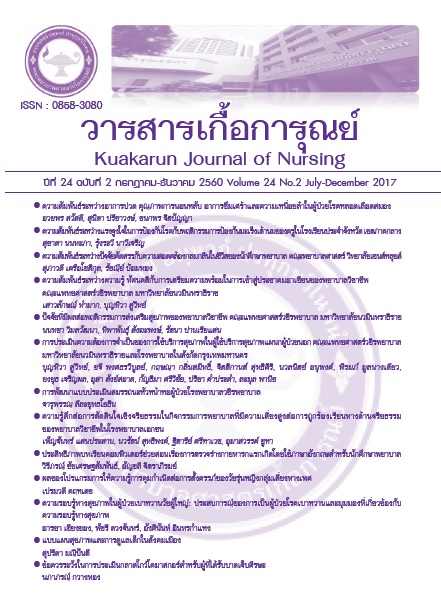Health Literacy in Diabetic Adult: Experience of Diabetic Patient and Perspective on Health Literacy
Main Article Content
Abstract
Abstract
This qualitative research aimed to study the learning process of self-management and perspective related to health literacy in adult diabetic patients.
The population consisted of 17 adults who were diagnosed with type 2 diabetes Mellitus for at least 5 years, aged between 21 and 60. Data was collected through in-depth interviews using semi-structured questionnaires and group discussion. All data was analyzed by using thematic analysis method. Major research findings indicated the following: Adult diabetic patients in terms of experiences and perspectives of being diabetic showed that severe negative experiences caused by diabetes mellitus related complications significantly impacts that leaded to changes in patient behaviors such as amputation, physical disability, Family trouble and unemployment. It also showed that patients’ perspectives on diabetes mellitus could be divided into three primary ideas which were as follows: 1) Diabetes mellitus was not a serious disease. 2) Diabetes had mellitus made life difficult. 3) Diabetic patients who were able to control their blood sugar levels believed that the success of glycemic control relied on patients’ sense of selfreliance and efficacy. In regard to perspectives towards health literacy in adult diabetic patients, the research found that (1) Patients who could control their blood sugar levels believed that the ideal information obtained and used for diabetes self-care must be analyzed and evaluated before usage on the other hand, patients who couldn’t do the same thing believed the health information from product reviews of wellknown people must be effective and good for health without examination. It also suggested that the extent of patients’ knowledge on diabetes also affected their decision-making regarding information analysis. If the patients had more knowledge about diabetes self-care, they would tend to assess information based on its credibility prior to practical uses. (2) In regard to communication among medication
providers and the controlled patients, the patients thought. 1) They badly needed intensive care from doctors.2) The doctors supposed to give advice to patients, and the patients must follow the advice for their own good health. 3) The effective communication with good relationship from the medication
providers made patients feel free to ask questions. On the contrary, the uncontrolled patients felt doctors were very difficult to talk with because of the hierarchical relationship; the doctor’s status seemed higher than the patients’. Patients perceived that, in hierarchical relationship, doctor had higher status than them. As doctors were respectful and formidable, this perception influenced. This perception influenced how information was communicated and transferred between medical providers and patients. Suggestions for the implementation from research findings can be used as guidance for developing health literacy among chronically ill patients by changing their perspective which resulted in the sustainable development of health behavior.
Article Details
References
Baker, D.W., Gazmararian, J.A., Williams, M.V., Scott, T., Parker, R. M., Green, D., Ren, J. Peel, J. (2002). Functional health literacy and the risk of hospital admission among Medicare managed care enrollees. American Journal of Public Health, 92(8), 1278-83.
DeWalt, D. A., Berkman, N. D., Sheridan, S., Lohr, K. N., & Pignone, M. P. (2004). Literacyand health outcomes: A systematic review of the literature. Journal of General
Internal Medicine, 19(12), 1228–1239.
Institute of Medicine Committee. (2004). Health literacy: A prescription to end confusion April 8, 2004 Report.
Ishikawa, H., Takeuchi, T. & Yano, E.(2008). Measuring functional, communicative, and critical health literacy among diabetic patients. Diabetes Care. 31(5), 874-879
Kitchenham, A. (2008). The evolution of John Mezirow’s transformative learning theory. Journal of Transformative Education, J16/27, 103 -123.

